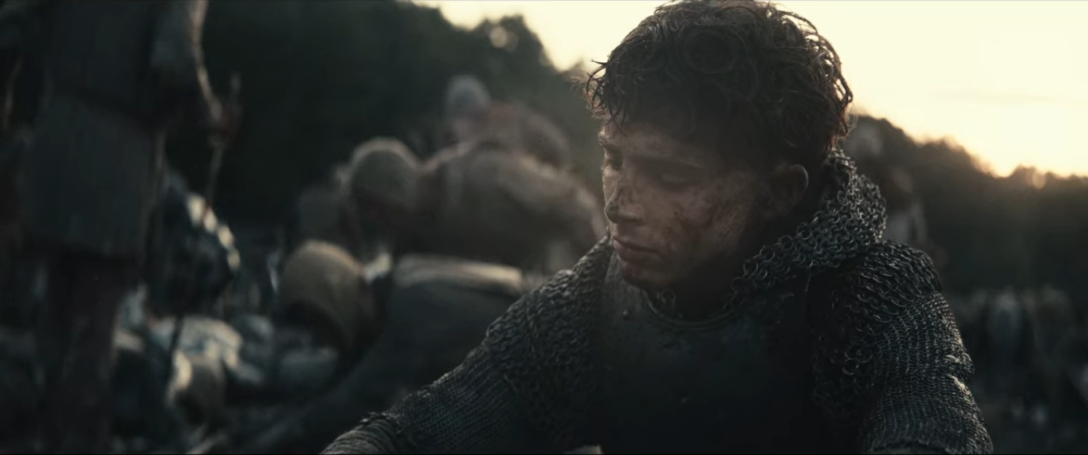The most generous way to describe the historical accuracy of 2019’s The King is “lukewarm at best”. The film, starring current Hollywood Golden Boy Timothée Chalamet as King Henry V, is (very) loosely based on several of the works of Shakespeare that chronicle the same period in Henry’s life.
When many people hear the name of Shakespeare mentioned in association with a film, their instant reaction is to drop it like it’s hot. Unfortunately there’s that pervasive stigma against the Bard and his works as being stuffy, boring and incomprehensible (when really that’s just the way to describe the teacher who taught you about his plays in the most boring way humanly possible).
The King is definitely something you should stick with, though, even if you are no fan of Shakespeare. It’s compelling and it’s generally well-written. For a film that is nearly two and a half hours long, there are never any pacing problems. A story such as this could easily get bogged down in the slow moments of its tale, but that never really happens in The King. Also, it’s honestly really only Shakespeare-adjacent, as its story does its own thing and nobody speaks in iambic pentameter.
The fact that The King doesn’t use Shakespearean dialogue, unlike other adaptations makes it more accessible to a wider audience, hopefully introducing more people to the wonders of Shakespeare. But it also means that we miss out on all of the Bard’s beautiful lines and witticisms. Really, this film is Shakespeare without the Shakespeare.
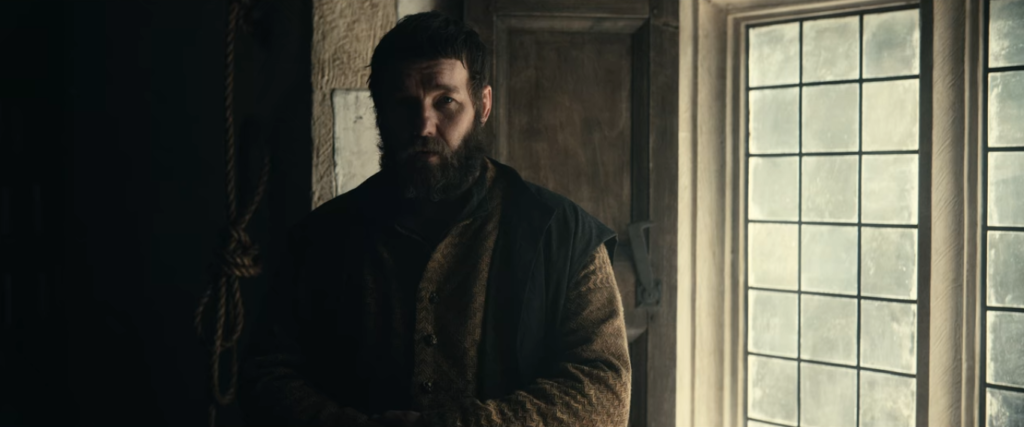
The film charts the rise of Henry V from a young man who cares more about the life of the party than he does the life of a king all the way to his victory at the Battle of Agincourt. It’s probably worth noting now that if you’re watching this film as a way to skip the study on your next history exam, don’t bother. The King will teach you about as much about the English royal family as an episode of The Tudors – i.e., not much.
Henry starts off the film as Hal. He lives only to drink and to whore, and he doesn’t give a toss about his tosser of a dad, the current King, Henry IV (Ben Mendelsohn). The amount of responsibility Hal is showing for his position as ruler can be clearly seen by what haircut he’s got: long locks equals long nights of drinking, bowl cut means he’s all business.
Chalamet (whose middle name is actually Hal, coincidentally), manages to make these early scenes very sincere. Henry isn’t shirking off his responsibilities as future king because he’s lazy; he’s doing it because he doesn’t want to continue the awful legacy of his father.
Accompanying Henry on his daily drinking sessions is John Falstaff (Joel Edgerton). Falstaff is probably Henry’s only true friend in the entire world, and Edgerton does a great job making him both a comedic figure but also someone wise (as proved later on in the film, when Falstaff’s military strategy helps secure an English victory against the French).
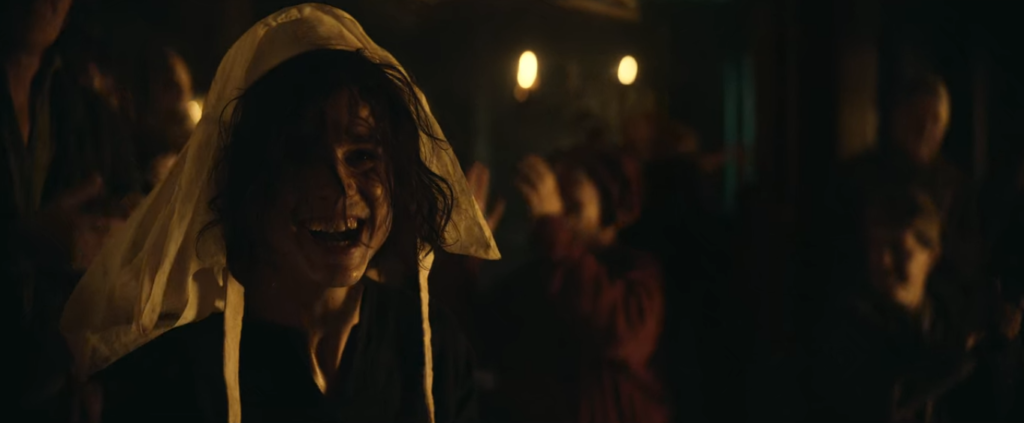
Of course, Henry can’t remain Hal forever – there would be no story otherwise. Following the death of his brother (who Henry IV originally named as his successor because of his older son’s waywardness), Henry assumes the role of King of England. It’s something he must do with a heavy heart, and he quickly learns that despite wanting to distance himself from the cruelty of his father’s rule, being a king means making difficult and sometimes violent choices.
Henry adapts quickly to being king, proving himself a generous and moderately-tempered ruler. Those who serve him seem to warm to him quickly. Other rulers also seem to welcome him – all except the Dauphin of France, Louis de Guyenne (Robert Pattinson), who sends an insulting gift. Immediately, a rivalry is established, and it is this conflict (and the internal conflicts it causes in Henry) that occupy the second half of the film.
Speaking of the Dauphin, he really is the star of the show, despite his limited appearances. Robert Pattinson has a delightfully ridiculous French accent, and even though the film’s portrayal of the Dauphin is not accurate to history, it’s so entertaining I don’t really mind (and besides, it’s not like much else in the film is incredibly historically accurate anyway).
Much of the film is leading towards this first confrontation between Henry and the Dauphin, and it does not disappoint. All Henry can do is just stand there, a look of amazement on his face as he listens to what the Dauphin says to him and honestly, that’s the same reaction the audience has as well. I genuinely never expected to see Robert Pattinson in a role like this and I love that that’s essentially the theme of his career now – “what’s the most unexpected (and unexpectedly brilliant) role I can take?”
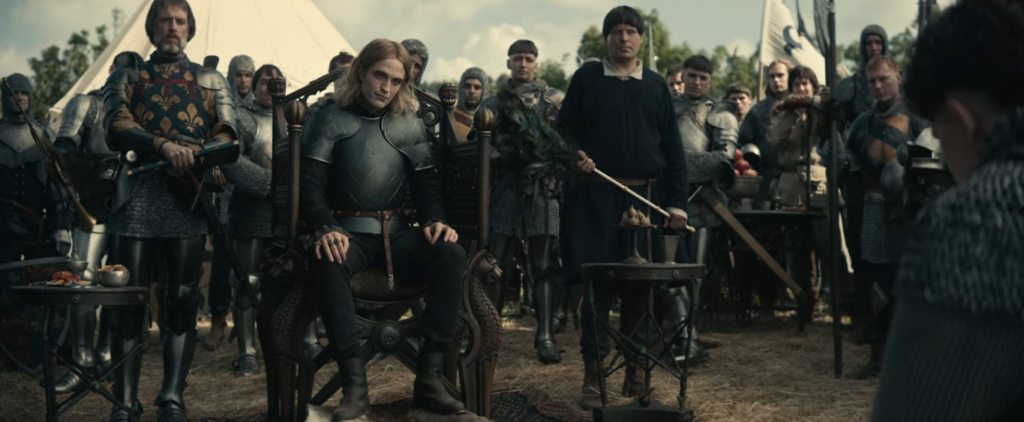
I do agree with the claims that this film is a bit Francophobic, though. There was no indication that historically the Dauphin was an idiot like he’s presented in this film – it’s all done to show the superior nature of Henry and his English army.
Confronting the Dauphin and going to war with France changes Henry. He is no longer able to escape the legacy of his father. Despite promising to be an “altogether different king” he does what all kings at the time did; he goes to war, he takes prisoners, he kills opponents. Chalamet does a good job with this. He has this quietness that at first indicates his calm, and later, his ferocity. He doesn’t need to yell or to scream when he is angry; the brutal nature of his new commands show how much he has changed.
The King’s supporting actors are excellent too. Ben Mendelsohn plays Henry IV with the same energy as Denethor from The Lord of the Rings (especially that tomato scene). He’s utterly repulsive, right up until the moment he dies. Sean Harris, as Henry’s backstabbing Chief of Justice Sir William Gascoigne, moves between being calmly caring and insidiously scheming almost seamlessly. Lily-Rose Depp, as Henry’s bride Catherine of Valois, only has a minor role but her scenes are some of the best in the entire film.
For the most part, The King looks fine, but it’s not the most creative film I’ve ever seen. The costumes and the settings look good, but there’s nothing that will really blow you away.
The battle scenes are where the film gets more creative with how it is shot. I wouldn’t call this film “stylish” in any way, but there are a few nice moments throughout (such as the boats landing on the French beach or a scene where Falstaff is lost in a sea of soldiers during a battle).
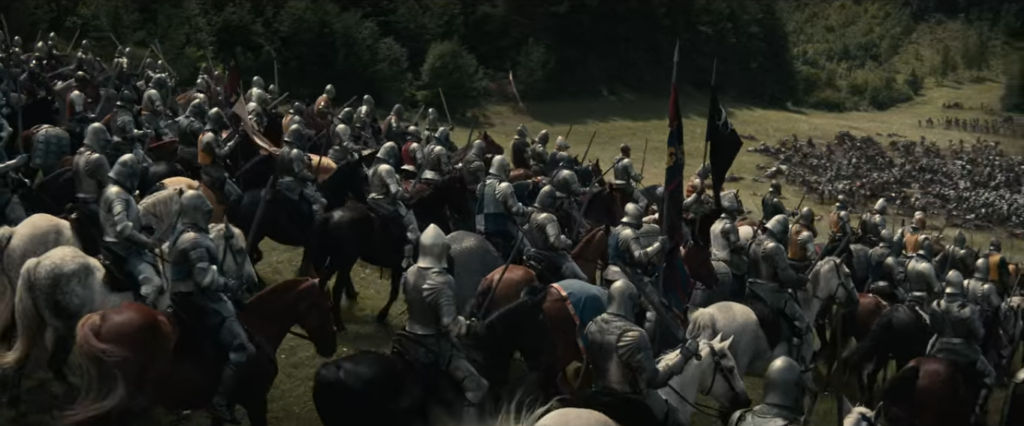
The King does a pretty good job of showing just how brutal battles at the time really would have been. Henry was right for not wanting to go to war. The sword fights are brutal and inglorious, just as they would have been at the time. They aren’t the swashbuckling feats of fencing that we are used to seeing, they mainly devolve into two men desperately wrestling on the ground and panting furiously under the weight of all the metal that adorns their bodies.
The final fight between Henry and the dauphin is the most inglorious of all. The dauphin wears armour that is way too heavy for the mud, and instantly loses his footing. Henry doesn’t kill him, though. That is the work of his soldiers, who eagerly descend upon the helpless man and slaughter him. There is no epic Hollywood-style fight to be had here. There’s just mud, and desperation.
So, should you watch The King? Well, if you’re hoping to learn something (or you’re incredibly bothered by historical inaccuracy), this film might not be what you’re looking for. However, if you want an interesting story that is well-acted by everyone involved, then crown The King a winner.
BEST BITS
- The performances.
- The pacing. So many things happen there’s never any time to be bored!
WORST BITS
- The historical inaccuracy. I like to learn things from historical films.
- They didn’t need to paint France as a country ruled by idiots.
FINAL RATING: 7/10
More like this: Should You Watch Outcast (2014)?
